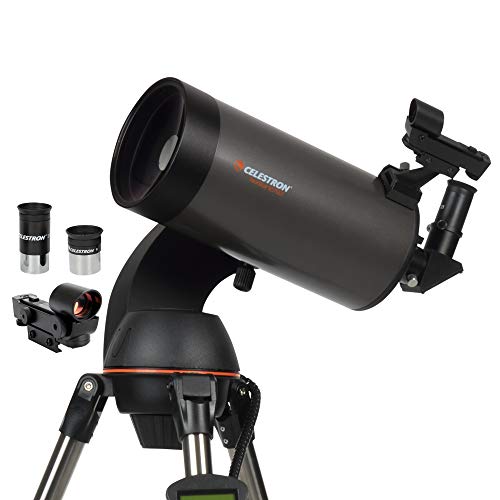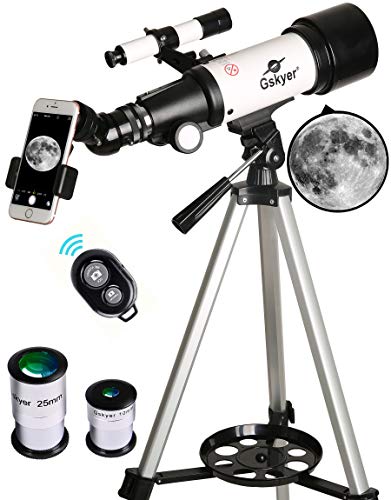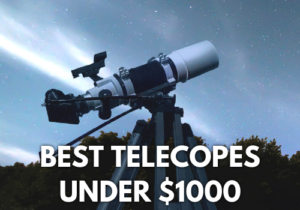The Best Telescope Brands In The World
Disclosure: This post contains affiliate links and I may earn a small commission (at no extra cost to you) if you click through and make a purchase. Thanks in advance – I really appreciate it!
Using a telescope to track and monitor the movements of the stars and planets in the night sky is not only a fun hobby, but it can also be a serious scientific undertaking. For a night of stargazing that is not just entertaining but also educational and informative as well, you need a good telescope from a good brand.
So, what are the best telescope brands?
The best telescope brands are Celestron, Orion, Meade, Gskyer, and Sky-Watcher. All the major telescope brands make all types of telescopes i.e. refractors, reflectors, Dobsonians, and computerized models. Each of these brands has one or more telescopes suitable for every user level.
In this article, we will discuss more on the 5 major telescope brands in the market today along with a few of their best-selling product offerings for beginners as well as professionals.
Telescopes That We Recommend
| Image | Title | Price | Prime | Buy |
|---|---|---|---|---|
 Top
Top | Celestron - PowerSeeker 127EQ | PrimeEligible | See on Amazon | |
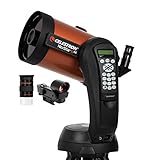 Top
Top | Celestron - NexStar 6SE | Prime | See on Amazon | |
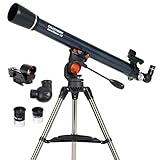 Top
Top | Celestron - AstroMaster 70AZ | PrimeEligible | See on Amazon | |
 Top
Top | Celestron - NexStar 127SLT | PrimeEligible | See on Amazon | |
 Top
Top | Orion 10015 StarBlast 4.5 Astro Reflector | Prime | See on Amazon | |
 Top
Top | Orion 09007 SpaceProbe 130ST | Prime | See on Amazon | |
 Top
Top | Orion 8945 SkyQuest XT8 Classic Dobsonian | Prime | See on Amazon | |
 Top
Top | Orion 9024 AstroView 90mm | Prime | See on Amazon | |
 Top
Top | Meade Instruments – Infinity 70mm | PrimeEligible | See on Amazon | |
 Top
Top | Meade Instruments – Polaris 114mm | PrimeEligible | See on Amazon | |
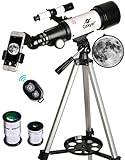 Top
Top | Gskyer Telescope, 70mm | PrimeEligible | See on Amazon | |
 Top
Top | Sky-Watcher Flextube 200 Dobsonian 8-inch Collapsible | Prime | See on Amazon | |
 Top
Top | Sky-Watcher EvoStar 80 APO Doublet Refractor | Prime | See on Amazon |
Product prices and availability are accurate as of the date/time indicated and are subject to change. Any price and availability information displayed on [relevant Amazon Site(s), as applicable] at the time of purchase will apply to the purchase of this product.
Prices pulled from the Amazon Product Advertising API on:The Best Telescope Brands
Celestron
Celestron was founded in the early 1960s by Tom Jhonson when he began inventing revolutionary new telescopes that had never been seen before on the consumer market.
Their world-class teams of optical and electronic engineers are still pushing the technological envelope today. It is safe to say that they have successfully transformed the pastime of astronomy for novices and advanced amateurs alike, from the SkyProdigy, a telescope so smart it can align itself, to Celestron’s high-performance EdgeHD optical system.
Their StarSense Explorer Technology has transformed the manual telescope by removing frequent beginner stumbling blocks and improving the user experience for even the most seasoned telescope users.
It tells you exactly which celestial objects are visible in the night sky right now, as well as where you should point your telescope to position those objects in the eyepiece. Furthermore, while observing, you can get the additional information and even audio descriptions for the most popular objects. To use a Celestron telescope, It is not necessary that you should have any prior knowledge of the celestial objects.
Another gem from Celestron is their premier astronomy software called Celestron Starry Night. Starry Night takes you on a journey of our Solar System’s past, present, and future, and can even simulate how the night sky will seem from your own garden, a nearby town, or anywhere on Earth.
The more you learn about how the night sky works through Starry Night, the more you’ll get out of each observing session with your telescope. You are only limited by your own curiosity. A 192-page illustrated astronomy book PDF and a comprehensive 146-page User’s Guide PDF are both included with the software.
Now let’s talk about a few of the top telescope models from Celestron. If you want an elaborate review of almost all the best-selling Celestron telescopes, you can go through that article here – 9 Best Celestron Telescopes & Reviews.
Celestron – PowerSeeker 127EQ
- Perfect entry-level telescope: The Celestron PowerSeeker 127EQ is an easy-to-use and powerful telescope. The PowerSeeker series is designed to give the new telescope user the perfect combination of quality, value, features, and power
- Perfect entry-level telescope: The Celestron PowerSeeker 127EQ is an easy-to-use and powerful telescope. The PowerSeeker series is designed to give the new telescope user the perfect combination of quality, value, features, and power
Prices pulled from the Amazon Product Advertising API on:
Product prices and availability are accurate as of the date/time indicated and are subject to change. Any price and availability information displayed on [relevant Amazon Site(s), as applicable] at the time of purchase will apply to the purchase of this product.
The Celestron – AstroMaster 70AZ is easy to set up and use, the AstroMaster 70AZ from Celestron is ideal for children, novice astronomers, and anyone looking to explore the night sky. This refractor telescope offers a 70mm aperture that’s just enough to enjoy the Moon, stars, and bright planets in fascinating detail.
This 70mm f/13 Alt-Az Refractor Telescope can be used as a multi-function starter-scope that can be used for both astronomical and terrestrial viewing. Its medium aperture and long focal length allow it to draw in a generous amount of light with a high magnification potential to allow observation of the larger planets and the moon.
Celestron – NexStar 127SLT
- Nexstar computerized telescope: The NexStar 6SE Computerized Telescope features Celestron’s iconic orange tube design with updated technology and the latest features for amazing stargazing for beginners and experienced observers.
- 6-Inch aperture: The 6-inch primary mirror in this Schmidt-Cassegrain telescope for adults and kids to be used together packs enough light-gathering ability to observe the best that our Solar System has to offer, while retaining a compact form factor.
Prices pulled from the Amazon Product Advertising API on:
Product prices and availability are accurate as of the date/time indicated and are subject to change. Any price and availability information displayed on [relevant Amazon Site(s), as applicable] at the time of purchase will apply to the purchase of this product.
The Celestron NexStar 6SE is an all-arounder, suitable for a wide range of skywatching applications, especially as it can be enjoyed by both newcomers to astronomy and seasoned observers with a thorough understanding of the night sky.
Click here to read Celestron NexStar 6SE’s full review.
This 150mm f/10 Schmidt-Cassegrain GoTo Telescope is a powerful, portable, and user-friendly Schmidt-Cassegrain-style scope that can be used for observing everything from the Moon and planets to deep-sky objects like stars, galaxies, and nebulae.
The Celestron NexStar 6SE hand controller offers a tour of the night sky and easily allows you to locate planets, galaxies, or any of the 40,000 celestial objects in its database.
Celestron – AstroMaster 70AZ
- Powerful refractor telescope: The Celestron AstroMaster 70AZ is a powerful and user-friendly refractor telescope with fully coated glass optics, a sturdy yet lightweight frame, 2 eyepieces, a red dot finder scope, and an adjustable-height tripod.
- High-quality 70mm optics: Our Celestron telescope features a powerful, fully coated 70mm glass optic objective lens. Erect image optics allow you to observe celestial objects at night and terrestrial targets like wildlife and landscapes during the day.
Prices pulled from the Amazon Product Advertising API on:
Product prices and availability are accurate as of the date/time indicated and are subject to change. Any price and availability information displayed on [relevant Amazon Site(s), as applicable] at the time of purchase will apply to the purchase of this product.
The Celestron – AstroMaster 70AZ is easy to set up and use, the AstroMaster 70AZ from Celestron is ideal for children, novice astronomers, and anyone looking to explore the night sky. This refractor telescope offers a 70mm aperture that’s just enough to enjoy the Moon, stars, and bright planets in fascinating detail.
This 70mm f/13 Alt-Az Refractor Telescope can be used as a multi-function starter-scope that can be used for both astronomical and terrestrial viewing. Its medium aperture and long focal length allow it to draw in a generous amount of light with a high magnification potential to allow observation of the larger planets and the moon.
Celestron – NexStar 127SLT
- Computerized star locating telescope: The Celestron NexStar 127SLT is a computerized telescope that offers a database of more than 40,000 stars, galaxies, nebulae, and more. The telescope locates your object with pinpoint accuracy and tracks it.
- Compact and portable: This telescope for adults and kids to be used together is ideal for weekend camping trips or excursions to dark sky sites. Its compact form factor makes it easy to transport and assemble just about anywhere.Optical Tube:Aluminum
Prices pulled from the Amazon Product Advertising API on:
Product prices and availability are accurate as of the date/time indicated and are subject to change. Any price and availability information displayed on [relevant Amazon Site(s), as applicable] at the time of purchase will apply to the purchase of this product.
With a decent-sized aperture, the Celestron NexStar 127 SLT is suitable for beginners, who want good views of the solar system and bright deep-sky targets. Its computerized mount is easy to set up and operate while attaching the supplied components is extremely intuitive. It’s the perfect telescope for anyone starting out.
The Celestron NexStar 127SLT 127mm f/12 Maksutov-Cassegrain GoTo Telescope gives users the ability to make detailed observations of the Moon, with the ability to easily see planets and reach outside the solar system to resolve distant objects like galaxies, nebulae, and binary or variable stars.
Orion
Orion Telescopes & Binoculars was founded in 1975 in California by Tim Gieseler. Orion sells a wide variety of telescopes that they characterize for all user levels. You may be a beginner, intermediate, or advanced astronomer, you will definitely find something for yourself in Orion’s lineup of telescopes that includes Newtonians, Maksutovs, Schmidt-Cassegrains, Ritchey-Chrétiens, and refractors with or without a variety of mounts. Orion also sells a series of Dobsonian telescopes that come in “Classic” and “IntelliScope” variants along with GoTo and tracking capabilities.
Orion 10015 StarBlast 4.5 Astro
- A great compact grab-and-go telescope designed for entry-level and intermediate astronomy enthusiasts; Focal length: 450mm
- Substantial 4.5 inch aperture and fast f/4 focal ratio provides bright, detailed views of solar system targets like the Moon and planets, as well as wide-field celestial objects like nebulas and star clusters
Prices pulled from the Amazon Product Advertising API on:
Product prices and availability are accurate as of the date/time indicated and are subject to change. Any price and availability information displayed on [relevant Amazon Site(s), as applicable] at the time of purchase will apply to the purchase of this product.
The Orion 10015 StarBlast 4.5 Astro is an amazing compact grab-and-go telescope designed for entry-level and intermediate astronomy enthusiasts. The Orion StarBlast tabletop Dobsonian is a great beginner telescope for amateurs young and old. It’s priced just right seeing as you’re putting more investment into the larger aperture versus into an alt-azimuth or equatorial mount on a tripod. Besides, the Dobsonian-style base is easier to use and much simpler for a beginner to get the hang of things.
Orion 09007 SpaceProbe 130ST
- This 5.1 inch aperture reflector telescope gathers an ample amount of light for great views of the planets and Moon, as well as brighter galaxies, nebulas, and star clusters
- Short 24 inch long optical tube design for easy portability and fast f/5 focal ratio for pleasing wide-field performance makes the SpaceProbe 130ST EQ a very versatile telescope the whole family can enjoy
- Sturdy EQ-2 equatorial telescope mount and adjustable tripod allows manual slow-motion tracking of celestial objects as they appear to migrate across the night sky , Counterweight bar length - 8 inches
Prices pulled from the Amazon Product Advertising API on:
Product prices and availability are accurate as of the date/time indicated and are subject to change. Any price and availability information displayed on [relevant Amazon Site(s), as applicable] at the time of purchase will apply to the purchase of this product.
The Orion 09007 SpaceProbe is a 5.1″ aperture reflector telescope that gathers an ample amount of light for great views of the planets and Moon, as well as brighter galaxies, nebulas, and star clusters.
The ST in the product name stands for “short tube,” and this type of telescope is perfect for wide-field viewing of large objects.
With a large aperture and a fast f/5 focal ratio, you’ll have a nice wide field of view for stargazing and seeking out nebulae and other DSOs. Its primary mirror is parabolic, so there will be little to no noticeable aberration.
Orion 8945 SkyQuest XT8 Classic Dobsonian
- Item may ship in more than one box and may arrive separately
- A large aperture Classic Dobsonian reflector telescope at a very affordable price!
- 8 diameter reflector optics lets you view the Moon and planets in close up detail, and has enough light grasp to pull in pleasing views of faint nebulas, galaxies and star clusters
Prices pulled from the Amazon Product Advertising API on:
Product prices and availability are accurate as of the date/time indicated and are subject to change. Any price and availability information displayed on [relevant Amazon Site(s), as applicable] at the time of purchase will apply to the purchase of this product.
Orion SkyQuest XT8 Classic Dobsonian’s 8″ diameter reflector optics lets you view the Moon and planets in close-up detail, and has enough light grasp to pull in pleasing views of faint nebulas, galaxies, and star clusters.
The telescopes feature an expertly figured parabolic mirror housed in an enameled steel optical tube. The tube rides on a stable Dobsonian base that allows easy point-and-view navigation and has a convenient carrying handle. A 2-inch Crayford focuser, EZ Finder II aiming device, and a 25 mm Sirius Plossl eyepiece (size 1.25-inch), are all standard equipment.
Orion 9024 AstroView Refractor
- A powerful, high-quality refractor telescope at a jaw-dropping low price
- 90mm (3.5) aperture and 910mm focal length for crisp views of deep-sky objects, the Moon, and planets
- Included EQ-2 adjustable tripod and equatorial mount for manual slow-motion celestial tracking
Prices pulled from the Amazon Product Advertising API on:
Product prices and availability are accurate as of the date/time indicated and are subject to change. Any price and availability information displayed on [relevant Amazon Site(s), as applicable] at the time of purchase will apply to the purchase of this product.
The Orion 9024 AstroView 90 is best suited for beginners. It’s not too pricey to justify it as a first-time buy, but the fact that it also allows for terrestrial viewing makes it a winner.
This refractor scope is an air-spaced achromatic doublet. While that does not provide the quality of an apochromatic doublet, it delivers surprisingly sharp and detailed views of the night sky but at a significantly lower price.
The AstroView 90 telescope, fully assembled, weighs only 24 lbs., and being a refractor, it doesn’t need collimation, so you can pick it up and easily move it around in one piece to dodge trees and other obstructions if need be, or keep it fully assembled and ready to use at a moment’s notice. Moreover, the scope needs little time to cool down even at low outdoor temperatures thanks to its small size.
Meade Instruments
Meade Instruments, also known simply as Meade, was founded in 1972 by John Diebel is one of the world’s largest manufacturers of telescopes. A manufacturer of binoculars, microscopes, spotting scopes, and charge-coupled device (CCD) cameras for astrophotography, Meade also trades under the name of Coronado in the sale of amateur solar telescopes for observing the surface of the sun.
Meade Instruments is acknowledged as one of the most innovative and dynamic companies in the telescope market. Known for its groundbreaking telescopic designs, Meade has introduced dozens of improvements over the years that have made amateur astronomy easier and more enjoyable than ever.
Meade Instruments – Infinity 70mm
- Aperture: 70mm(2.8). Focal Length: 700mm. Focal Ratio: f/10. Rack-and-Pinion Focuser
- Altazimuth mount with a slow motion control rod for precision tracking means you can easily track objects day or night
- Low (26mm) and high (9mm) magnification eyepieces give you variety for any viewing situation & 2x barlow lens doubles the magnifying power of each eyepiece
Prices pulled from the Amazon Product Advertising API on:
Product prices and availability are accurate as of the date/time indicated and are subject to change. Any price and availability information displayed on [relevant Amazon Site(s), as applicable] at the time of purchase will apply to the purchase of this product.
The Meade Infinity 70mm f/10 Alt-Azimuth Refractor Telescope is perfect for beginners as it gives them a complete setup for viewing the Moon, planets, and meteor showers.
Its manual alt-azimuth mount has an altitude lock and slow-motion controls for precise tracking of subjects. Two eyepieces provide 27x and 78x magnifications with a 2x Barlow lens that doubles the magnification of each eyepiece for a wider range of observing possibilities.
The Infinity 70 will show you a lot of detail on the Moon, Mercury, and Venus’ phases, the ice cap on Mars when it’s at opposition, as well as Jupiter’s cloud bands, the Great Red Spot, and its satellites. Saturn’s rings and its moon Titan are visible, and on a good night, some of Saturn’s cloud bands and the Cassini division in its rings may be spotted.
Meade Instruments – Polaris 114mm
- Aperture: 114mm(4. 5). Focal Length: 1000mm. Focal Ratio: f/8. 8. Rack-and-Pinion Focuser, Setting Circles, Latitude Control w/Scale
- Large, stable German equatorial mount with slow motion controls makes tracking celestial objects smooth and simple
Prices pulled from the Amazon Product Advertising API on:
Product prices and availability are accurate as of the date/time indicated and are subject to change. Any price and availability information displayed on [relevant Amazon Site(s), as applicable] at the time of purchase will apply to the purchase of this product.
The Meade Polaris 114mm f/8.8 Equatorial Reflector Telescope is designed to take astronomy to the next level by providing a complete setup for viewing the planets and deep-sky objects like galaxies, star clusters, and nebulae.
The telescope comes with 3 eyepieces that provide 38.5x, 111x, and 159x magnifications with a 2x Barlow lens that doubles the magnification of each eyepiece for a wider range of observing possibilities.
It also features a larger stable equatorial mount with slow-motion controls that makes it easy to track celestial objects as they move across the night sky.
Gskyer
Gskyer is a well-known brand in the area of optics, particularly telescopes, and is based in China. Gskyer is said to excel at producing all three types of telescopes: refractor, reflector, and catadioptric.
Gskyer offers a wide range of telescope types, catering to the demands of both professionals and beginners. Gskyer also manufactures appropriate accessories for its telescopes, such as mounts, tripod stands, finder scopes, and travel bags.
Gskyer Telescope 70mm
- Quality Optics: 400mm(f/5.7) focal length and 70mm aperture, fully coated optics glass lens with high transmission coatings creates stunning images and protect your eyes. Perfect telescope for astronomers to explore stars and moon.
- Magnification: Come with two replaceable eyepieces and one 3x Barlow lens.3x Barlow lens trebles the magnifying power of each eyepiece. 5x24 finder scope with mounting bracket and cross-hair lines inside make locating objects easily.
Prices pulled from the Amazon Product Advertising API on:
Product prices and availability are accurate as of the date/time indicated and are subject to change. Any price and availability information displayed on [relevant Amazon Site(s), as applicable] at the time of purchase will apply to the purchase of this product.
The Gskyer Telescope 70mm should be your top pick if you are looking for a telescope that is affordable, portable, easy to use for beginners, and has a great build quality.
It comes with all of the standard features that you want to play around with, is durable and well constructed, and has a low sticker price.
This telescope is incredibly simple to use, thanks to its basic, fluid altazimuth mount. It won’t be long before you’re hunting for exciting things to see in the night sky. This makes it ideal for children and young astronomers.
The considerable focal length also allows you to capture vast landscapes or observe fly objects of earth. The telescope comes with replaceable eyepieces and a Barlow lens which enhances the power of the telescope lens.
Gskyer Telescope 90mm
The Gskyer Telescope 90mm is one of the high-end beginner telescopes, offering great optical power and a couple of extras such as an image erect prism for ease of use.
This telescope’s optical tube is made of aluminum alloy, which makes it extremely sturdy. The tube ring, which improves attachment, makes the telescope effortless to use. It comes with an altazimuth mount and a stainless steel tripod, making it easy to use while improving focus.
You may use this telescope to observe the moon, stars, meteors, and planets, despite the fact that it is a beginner’s telescope. The telescope has excellent clarity, allowing you to see the moon’s surface, Saturn’s rings, and Jupiter’s moons. It can also be used for terrestrial viewing to observe birds, wildlife, and insects.
Sky-Watcher
Sky-Watcher was founded in 1999 by David Shen who started in the telescope industry as a polishing technician.
Sky-Watcher, one of the world’s largest telescope manufacturers, has introduced a wide choice of equipment to fit all budgets and skywatching levels – whether you’re a beginner, moderate, or advanced observer.
The Sky-Watcher product range includes telescopes with apertures ranging from 2.4″ (60 mm) to 16″ (406 mm) with manual, motor-driven, or GoTo mounts. Sky-Watcher has been producing Dobsonians with collapsible tubes, called FlexTube-Dobsonians, since 2008.
Sky-Watcher Flextube 200 Dobsonian 8-inch Collapsible
- LARGE APERTURE: Get a bright, bold viewing experience at a fraction of the cost of other optical designs.
- INNOVATIVE COLLAPSIBLE DESIGN: Unique strut design allows for optical tube to collapse for ease of portability while keeping collimation.
- PROPRIETARY TENSION CONTROL HANDLES: These patented handles allow for accurate movement without the need for perfect balance.
Prices pulled from the Amazon Product Advertising API on:
Product prices and availability are accurate as of the date/time indicated and are subject to change. Any price and availability information displayed on [relevant Amazon Site(s), as applicable] at the time of purchase will apply to the purchase of this product.
The Sky-Watcher 8” Collapsible Dobsonian telescope is a travel-friendly, yet powerful amateur telescope.
Sky-Watcher’s 8” collapsible Dobsonian has a solid rocker mount, flat equatorial disc stand, and a 1200mm focal length with a 203mm aperture designed for deep-field viewing with ease. If great viewing of galaxies, nebulae, and star clusters is your stargazing desire then this amazing large aperture light bucket is perfect for you.
Overall this is a highly recommendable telescope. The accessories are useful, and there’s plenty of avenues for upgrades owing to the 2” focuser. Its compact collapsible tube is very useful, and its ease of use is fantastic. As a first telescope or as an upgrade from a smaller telescope, I can highly recommend it.
Sky-Watcher EvoStar 80 APO Doublet Refractor
- EXPERTLY MATCHED GLASS: The EvoStar series features a matched doublet objective including one synthetic fluorite element, providing excellent color correction for visual and photographic uses
- OUTSTANDING COLOR CORRECTION: Using the finest quality glass and proprietary Metallic High-Transmission Coatings (MHTC), EvoStar refractors produce tack sharp images with accurate color and minimal aberrations
Prices pulled from the Amazon Product Advertising API on:
Product prices and availability are accurate as of the date/time indicated and are subject to change. Any price and availability information displayed on [relevant Amazon Site(s), as applicable] at the time of purchase will apply to the purchase of this product.
The Sky-Watcher EvoStar 80mm f/7.5 Doublet APO Refractor features a doublet apochromatic lens system with Extra-low Dispersion (ED) glass and Sky-Watcher’s proprietary photon anti-rejection Metallic High-Transmission Coatings (MHC) on all air-to-glass optical surfaces.
This combination of glass, lenses, and coatings virtually eliminates chromatic aberrations for clear and bright high-contrast images with true color rendition.
This is a telescope geared at professional or semi-professional astronomers and astrophotographers.
If you are looking for some of the best optical quality on the market, and are willing to pay the price for it, this is a phenomenal telescope that really does offer some truly stunning views.
Conclusion
As making a telescope is a highly technical operation, even a minor error can cause disastrous aberrations and ruin the entire equipment, that is why there are very few trustworthy brands in the sector of astronomy and telescope manufacturing.
The telescope brands and telescope models that we mentioned here are truly the best available in the market today. All of the models that we mentioned in this article are tried and tested by hundreds of happy and satisfied customers. So, you can purchase any of the models that suit your requirements and match your budget.
Related Rewiews
ABOUT US
We are a team of active amateur astronomers, here to help you with all your astronomy and science related needs – this is anything, from reviewing the latest telescopes to be released to talking about gravity and neurons. The Big Bang Optics was started because of our love for astronomy and to help others like us find the best telescope and accessories.
LEGAL DISCLAIMER
The Big Bang Optics is a participant in the Amazon Services LLC Associates Program, an affiliate advertising program designed to provide a means for sites to earn advertising fees by advertising and linking to Amazon.com. The Big Bang Optics also participates in affiliate programs with Clickbank and other sites. The Big Bang Optics is compensated for referring traffic and business to these companies.




